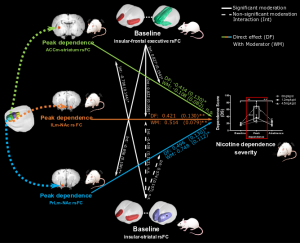Featured Paper of the Month – July 2020.
Developing brain-based biomarkers to assess drug dependence, including nicotine dependence, are essential to assess and improve the current, marginally effective, treatments. In humans, using brain-based resting state functional connectivity, we have previously identified a circuit between the dorsal anterior cingulate cortex(ACC) and the striatum whose connectivity decreased with increasing nicotine dependence severity. This circuit was unaffected by acute nicotine administration, suggesting a trait marker of nicotine addiction. However, whether this trait circuit dysregulation is predispositional or resultant from nicotine dependence remained unclear. Using a rat model of nicotine dependence in combination with longitudinal fMRI measurements, we recapitulated this ACC-striatum relationship in the rodent and determined that this circuit-dependence relationship was moderated by predispositional insular-frontal cortical functional connectivity. These data suggest that across species, the relationship between ACC-striatal functional connectivity and nicotine dependence severity is biased by baseline, pre-nicotine exposure individual differences in insular-based striatal-frontal circuits. Thus, pre-drug administration insular-ACC (regional components of the Salience Network, SN) functional circuits within a rodent homologue of the human SN, first observed cross-sectionally in humans and recapitulated herein, may drive nicotine-induced changes in ACC-striatal connectivity and its relationship with nicotine dependence severity.
Publication Information
In: Neuropsychopharmacology, vol. 45, no. 6, pp. 1042–1049, 2020, ISBN: 1740-634X.


